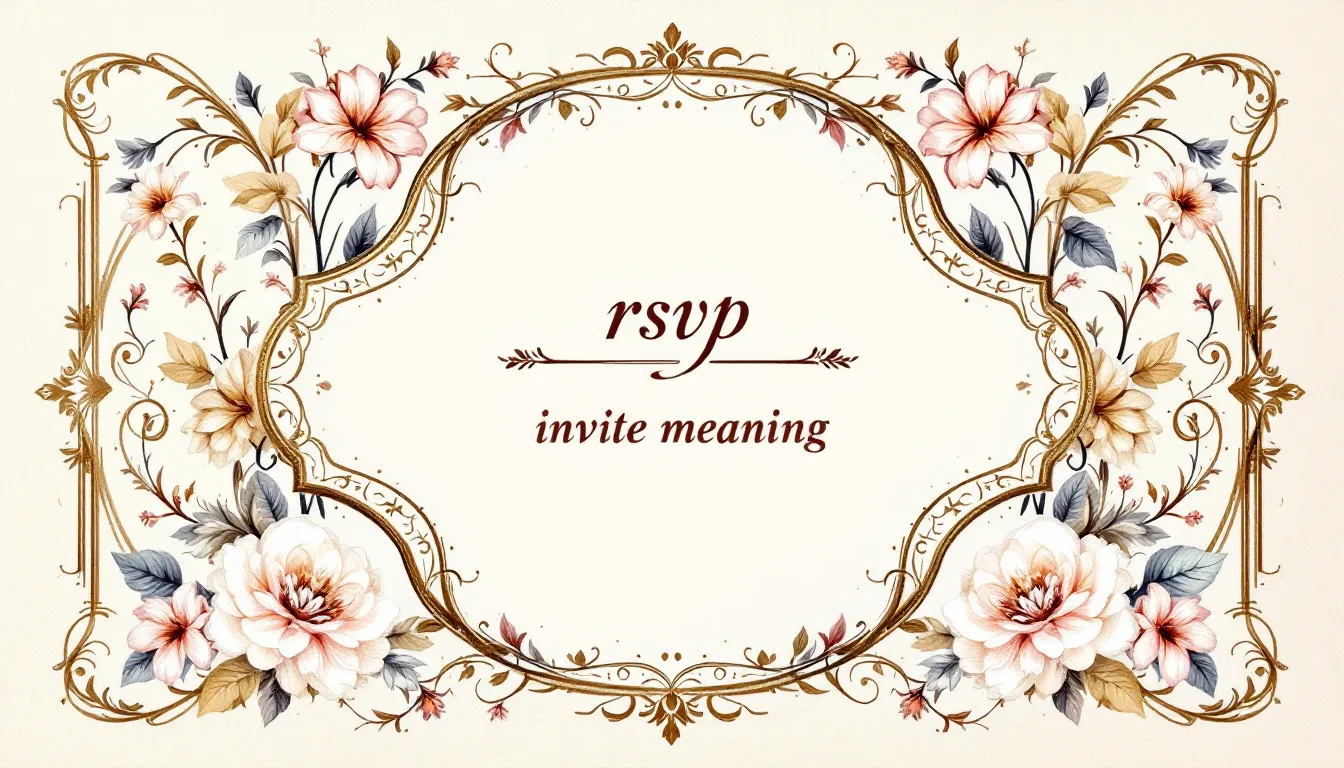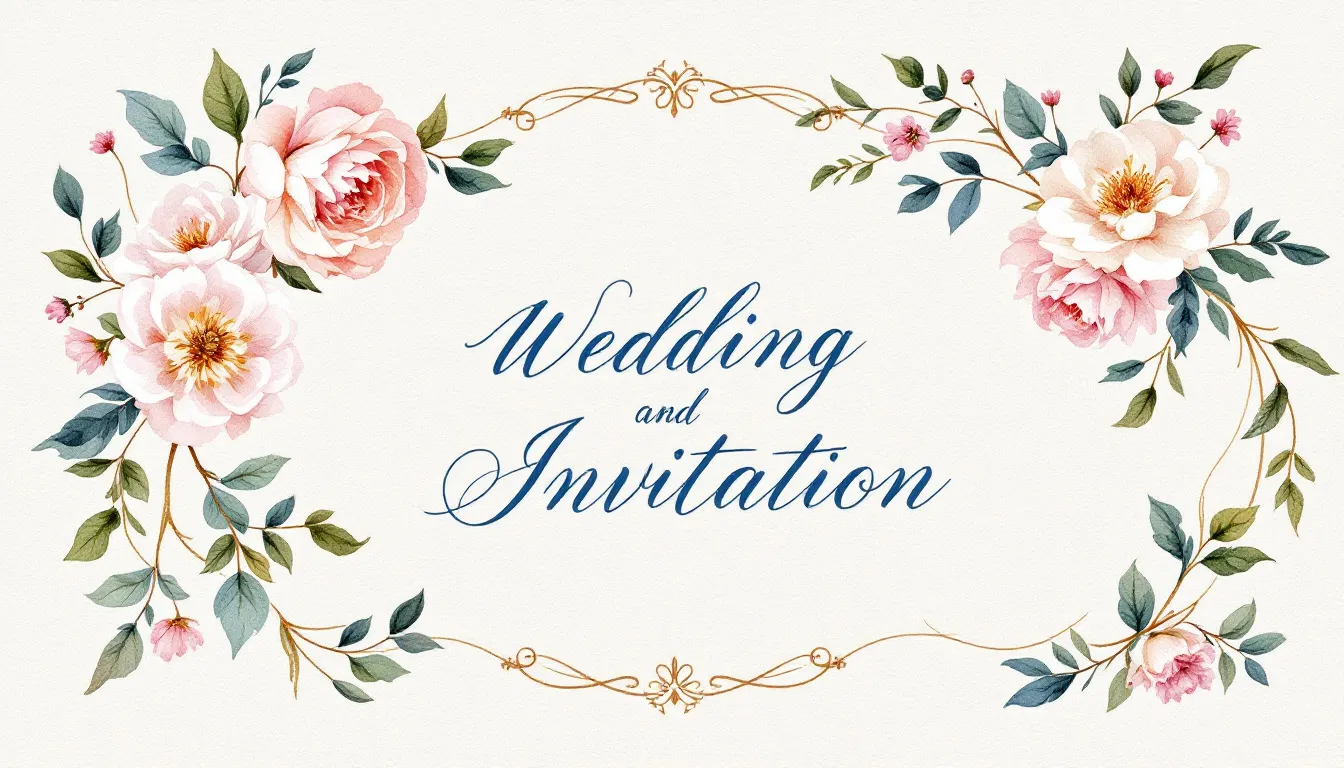RSVP invite meaning is straightforward: it asks you to confirm your attendance. RSVP, short for ‘répondez s’il vous plaît,’ translates to ‘please respond.’ Knowing this helps you understand why hosts need RSVPs and how you should respond.
Key Takeaways
-
RSVP stands for ‘répondez s’il vous plaît,’ and it’s crucial for helping hosts plan their events effectively.
-
Responding promptly to RSVPs is a sign of respect for the host, helping reduce their stress and ensure smooth event logistics.
-
Good RSVP etiquette includes clear communication, timely responses, and avoiding common mistakes like unreadable handwriting or omitting guest details.
What Does RSVP Mean?

RSVP is an abbreviation derived from the French phrase “répondez s’il vous plaît.” This translates to “respond if you please.” It’s a polite way to request that guests confirm their attendance at an event. While this term, which rsvp means, originated in France, it’s now more commonly used in English-speaking countries.
Interestingly, in France, the term ‘RSVP’ is considered quite formal, and people often use ‘SVP’ in more casual settings. However, in most English-speaking countries, ‘RSVP’ has become the standard phrase on invitations, from wedding invitations to birthday parties, emphasizing the need to know how many people are expected.
So, next time you see “RSVP” on an invitation, remember it’s more than just a fancy phrase; it’s a key element in helping hosts prepare for their guests.
Why Hosts Use RSVPs
Hosts use RSVPs for a plethora of reasons, but the primary one is logistics. Knowing how many people will attend helps determine the quantity of enough food and seating needed for the event. This prevents the awkwardness of running out of food or having too many empty seats, ensuring that the event runs smoothly.
RSVPs also significantly aid in budgeting. Knowing the number of attendees helps hosts finalize guest lists and manage budgets efficiently. Imagine planning a wedding with no idea how many guests will show up—that’s a recipe for financial disaster. Additionally, timely RSVPs allow hosts to accommodate guests’ dietary restrictions, making sure everyone has something to eat.
Failing to RSVP disrupts planning. Inaccurate headcounts can cause hosts to over-prepare or under-prepare, leading to stress and potential embarrassment. So, when you see “please RSVP,” know that it’s more than a request—it’s a lifeline for the host.
How to Respond to an RSVP

Responding to an RSVP might seem straightforward, but there’s a bit of etiquette involved. When you receive an invitation, the first thing to do is check for an RSVP card. This card usually indicates whether or not you’ll attend and may even include food options for the event. If there’s no RSVP card, the invitation or wedding website will often provide details on how to respond.
When filling out an RSVP card, make sure to include your name and indicate whether you’ll accept or decline the invitation. If you’re bringing a guest, note that too, but only if the invitation specifies a plus-one. For digital RSVPs, a short, polite email confirming your attendance works just as well. And don’t forget to add a personal touch; a short note expressing your excitement or regrets can go a long way.
Accurate information is crucial. If the RSVP card asks for meal preferences, make your selection clear. This helps the host prepare and ensures that everyone is catered to. Ultimately, responding to an RSVP goes beyond a simple ‘yes’ or ‘no’; it assists the host in planning a memorable event.
The Importance of Responding Promptly
Promptly responding to an RSVP shows respect and appreciation for the host’s planning efforts. Imagine receiving an invitation, marking it as ‘read,’ and then forgetting to respond. This not only leaves the host in a lurch but also reflects poorly on you as a considerate guest.
Timely RSVPs help hosts reduce planning stress and make appropriate arrangements for the expected attendance. Even if you’re declining the invitation, responding promptly acknowledges the host’s effort and shows that you value their invitation. It’s a small gesture that goes a long way in maintaining good relationships.
Ignoring an RSVP or responding late can cause unnecessary stress for the hosts. If you’re unsure about your schedule, inform the host promptly and ask if it’s acceptable to delay your final response. This way, you’re still being considerate while managing your own commitments.
Changing or Canceling an RSVP
Life happens, and sometimes plans change. If plans change after initially accepting, inform the host promptly. Quick communication allows them to adjust their plans efficiently, whether rearranging seating or modifying the catering order.
When informing the host about a change in your attendance, a handwritten note can add a thoughtful touch. If you can’t attend, consider sending a small gift as a gesture of goodwill. Remember, changing an RSVP from ‘yes’ to ‘no’ should only be done for significant and unforeseen circumstances.
When canceling an RSVP, a sincere apology and valid reason are essential. If you need to decline an invitation, doing so via email can help avoid any pressure from the host to change your mind. This way, you respect the host’s efforts while managing your own commitments.
Different Types of RSVPs
RSVPs appear in various forms suited to different events. For formal occasions like weddings, traditional response cards sent via mail remain popular. These cards often come with pre-addressed and stamped envelopes for the convenience of guests.
Digital RSVPs have gained popularity recently due to their convenience. With the click of a button, guests can confirm their attendance, making it easier for hosts to manage responses. However, digital RSVPs may be less accessible for older guests who aren’t as tech-savvy.
Some invitations feature a ‘regrets only’ option, where guests only need to respond if they cannot attend. This method simplifies the process but still ensures that most invitations provide the host with an accurate headcount.
Whether traditional or digital, the key is to respond promptly in a timely and respectful manner.
RSVP Etiquette Tips

Good RSVP etiquette is about more than just responding; it’s about being a considerate guest. Customizing RSVP cards based on whether traditional or online responses are preferred can accommodate varying guest preferences. This flexibility facilitates prompt responses from everyone.
Honesty is crucial when responding to an RSVP. If you have prior commitments, it’s better to be upfront about it. If additional guests are allowed, clearly communicate this and follow any provided guidelines.
Good RSVP etiquette maintains relationships and ensures events run smoothly. Whether it’s a grand wedding or an intimate dinner, your timely and thoughtful response can make all the difference, reflecting good manners.
Common Mistakes to Avoid with RSVPs
A common RSVP mistake is illegible handwriting, which confuses hosts. Always ensure your writing is clear and easy to read. Another common error is omitting the number of guests attending, especially when a plus-one is allowed.
Using nicknames instead of full legal names can also create confusion, so it’s better to use your full name. Including names of uninvited guests is inappropriate and can put the host in a difficult position. To avoid these pitfalls, double-check your RSVP card before sending it off.
Lastly, omitting guest names on the RSVP card can result in inaccurate headcounts for hosts. Accurate and clear responses ensure that the host can prepare adequately, making the event enjoyable for everyone.
Summary
In summary, RSVPs are a vital part of event planning that helps hosts prepare adequately for their guests. From understanding the meaning of RSVP to knowing how to respond and the importance of timely responses, every detail counts. Practicing good RSVP etiquette ensures that events run smoothly and maintains healthy relationships between hosts and guests.
So, the next time you receive an invitation, remember the power of those little letters—RSVP. Respond promptly and courteously, and you’ll be helping to create a memorable event for everyone involved.
Frequently Asked Questions
What does RSVP stand for?
RSVP stands for "répondez s'il vous plaît," which translates to "respond if you please." It's a polite way of asking guests to confirm their attendance.
Why is it important to RSVP?
It's crucial to RSVP because it allows hosts to adequately prepare for the event, making sure there's enough food and seating for everyone. This way, everyone can have a great time without any last-minute hiccups!
How should I respond to an RSVP?
Simply reply using the method specified in the invitation—like an RSVP card, email, or a digital option. Just be sure to let them know if you’ll be attending or not!
What should I do if my plans change after I've RSVP'd?
If your plans change after you've RSVP'd, just let the host know as soon as you can, ideally through a quick note or email. It’s courteous to offer a brief explanation too!
Are there different types of RSVPs?
Absolutely, RSVPs come in various forms like traditional mailed ones, digital responses, and 'regrets only' options, depending on the event's nature. Choosing the right type can really help streamline your planning!

